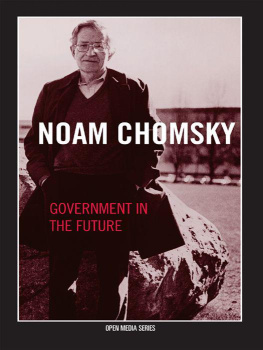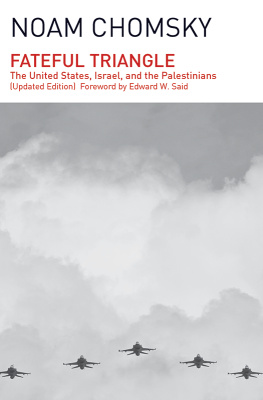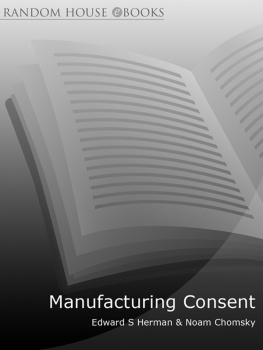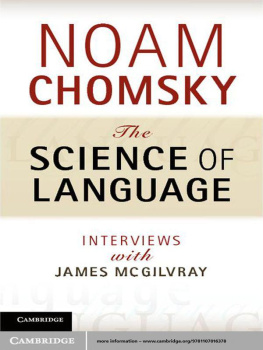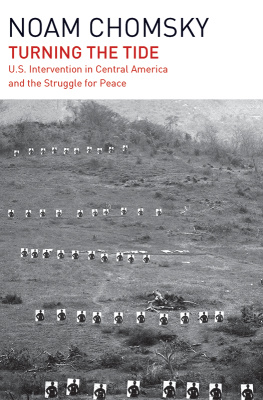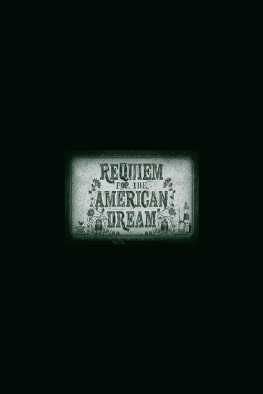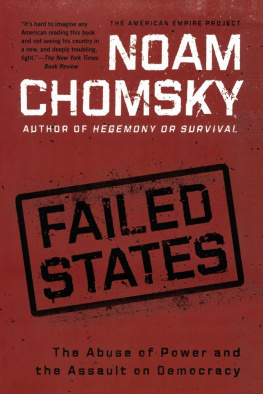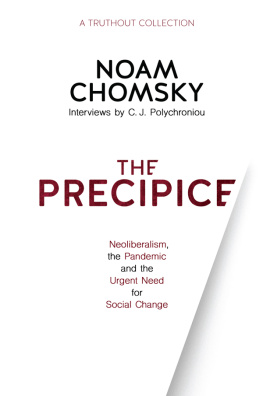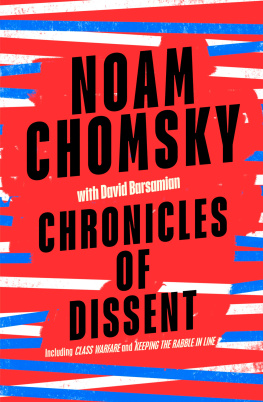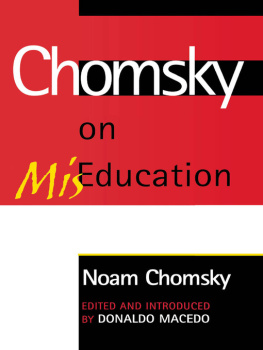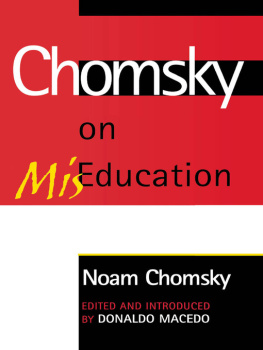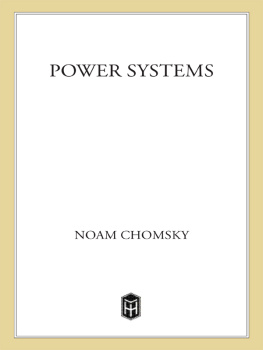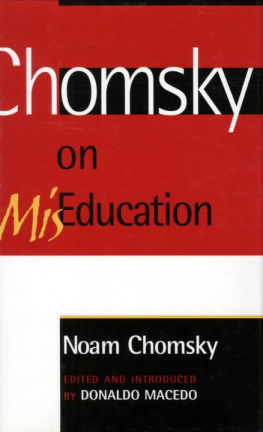Noam Chomsky - Government in the Future
Here you can read online Noam Chomsky - Government in the Future full text of the book (entire story) in english for free. Download pdf and epub, get meaning, cover and reviews about this ebook. City: New York, year: 2005, publisher: Seven Stories Press, genre: Politics. Description of the work, (preface) as well as reviews are available. Best literature library LitArk.com created for fans of good reading and offers a wide selection of genres:
Romance novel
Science fiction
Adventure
Detective
Science
History
Home and family
Prose
Art
Politics
Computer
Non-fiction
Religion
Business
Children
Humor
Choose a favorite category and find really read worthwhile books. Enjoy immersion in the world of imagination, feel the emotions of the characters or learn something new for yourself, make an fascinating discovery.
- Book:Government in the Future
- Author:
- Publisher:Seven Stories Press
- Genre:
- Year:2005
- City:New York
- Rating:5 / 5
- Favourites:Add to favourites
- Your mark:
- 100
- 1
- 2
- 3
- 4
- 5
Government in the Future: summary, description and annotation
We offer to read an annotation, description, summary or preface (depends on what the author of the book "Government in the Future" wrote himself). If you haven't found the necessary information about the book — write in the comments, we will try to find it.
Government in the Future — read online for free the complete book (whole text) full work
Below is the text of the book, divided by pages. System saving the place of the last page read, allows you to conveniently read the book "Government in the Future" online for free, without having to search again every time where you left off. Put a bookmark, and you can go to the page where you finished reading at any time.
Font size:
Interval:
Bookmark:
Copyright 1970, 2005 by Noam Chomsky
Open Media Series Editor: Greg Ruggiero
All rights reserved. No part of this book may be reproduced, stored in a retrieval system, or transmitted in any form, by any means, including mechanical, electric, photocopying, recording or otherwise, without the prior written permission of the publisher.
Seven Stories Press
140 Watts Street
New York, NY 10013
www.sevenstories.com
In Canada:
Publishers Group Canada, 559 College Street, Ste. 402, Toronto, ON M6G IA9
In the UK:
Turnaround Publisher Services Ltd., Unit 3, Olympia Trading Estate, Coburg Road, Wood Green, London N22 6TZ
In Australia:
Palgrave Macmillan, 1519 Claremont Street, South Yarra VIC 3141
eISBN: 978-1-60980-224-0
College professors may order examination copies of Seven Stories Press titles for a free six-month trial period. To order, visit www.sevenstories.com/textbook , or fax on school letterhead to (212) 226-1411.
v3.1
New York City, February 16, 1970
What is the role of the state in an advanced industrial society? To answer that question, I think its useful to set up as a framework for discussion four somewhat idealized positions. I want to call these positions, first, classical liberal, second, libertarian socialist, third, state socialist, fourth, state capitalist. And I want to consider each in turn. Also, I want to make clear my own point of view in advance, so that you can better evaluate and judge what I am saying. I think that the libertarian socialist conceptsand by that I mean a range of thinking that extends from left-wing Marxism through anarchismare fundamentally correct and that they are the proper and natural extensions of classical liberalism into the current era of advanced industrial society.
In contrast, it seems to me that the ideology of state socialism, that is, what has become of Bolshevism and of state capitalismthe modern welfare stateare regressive and highly inadequate social theories, and a large number of our really fundamental problems stem from a kind of incompatibility and inappropriateness of these dominant social forms to modern industrial societies.
Well, then, let me consider these four points of reference in sequencebeginning with the classical liberal point of view.
Classical liberalism asserts as its major idea an opposition to all but the most restricted and minimal forms of state intervention in personal and social life. This conclusion is quite familiar. However, the reasoning that leads to it is less familiar and I think a good deal more important than the conclusion itself.
One of the earliest and most brilliant expositions of this position is in Wilhelm von Humboldts Limits of State Action, which was written in 1792, though not published as a book until sixty years after that. In his view, the state tends to make man an instrument to serve its arbitrary ends, overlooking his individual purposes, and since humans are in their essence free, searching, self-perfecting beings, it follows that the state is a profoundly antihuman institution. That is, its actions and existence are ultimately incompatible with the full harmonious development of human potential in its richest diversityhence incompatible with what Humboldt and, in the following century, Marx, Bakunin, Mill, and many others saw as the true end of man. (And, for the record, I think that this is an accurate description.)
In this sense, the modern conservative tends to regard himself as the lineal descendant of the classical liberal. But I think that can only be maintained from an extremely superficial point of view, as one can see by studying more carefully the fundamental ideas of classical libertarian thought, expressed in my opinion in its most profound form by Humboldt.
I think the issues are of quite considerable contemporary significance, and if you dont mind what may appear to be a somewhat antiquarian excursion, Id like to expand on them.
For Humboldt, as for Rousseau and before him the Cartesians, mans central attribute is his freedom.
To inquire and to createthese are the centres around which all human pursuits more or less directly revolve.
But he goes on to say that
all moral culture springs solely and immediately from the inner life of the soul, and can never [be] produced by external and artificial contrivances. The cultivation of the understanding, as any of mans other faculties, is generally achieved by his own activity, his own ingenuity, or his own methods of using the discoveries of others.
From these assumptions Humboldt develops an educational theory, though I wont pursue it now. But also far more follows. Humboldt goes on to develop the rudiments of a theory of exploitation and of alienated labor that suggests in significant ways, I think, the early Marx. Humboldt in fact continues the comments that I quoted about the cultivation of the understanding through spontaneous action in the following way. He says that man never regards what he possesses as so much his own, as what he does; and the labourer who tends a garden is perhaps in a truer sense its owner, than the listless voluptuary who enjoys its fruits. And since truly human action is that which flows from inner impulse,
it seems as if all peasants and craftsmen might be elevated into artists; that is, men who love labour for its own sake, improve it by their own plastic genius and inventive skill, and thereby cultivate their intellect, ennoble their character, and exalt and refine their pleasures. And so humanity would be ennobled by the very things which now, though beautiful in themselves, so often serve to degrade it. [F]reedom is undoubtedly the indispensable condition, without which even the pursuits most congenial to individual human nature, can never succeed in producing such salutary influences. Whatever does not spring from a mans free choice, or is only the result of instruction and guidance, does not enter into his very being, but remains alien to his true nature; he does not perform it with truly human energies, but merely with mechanical exactness.
And if a man acts in a mechanical way, reacting to external demands or instructions rather than in ways determined by his own interests and energies and power, we may admire what he does, but we despise what he is.
For Humboldt, then, man is born to inquire and create, and when a man or a child chooses to inquire or create out of his own free choice, then he becomes in his own terms an artist rather than a tool of production or a well-trained parrot. This is the essence of his concept of human nature. And I think that it is very revealing and interesting compared with Marx, with the early Marx manuscripts, and particularly his account of the alienation of labor when work is external to the worker, not part of his nature, [so that] he does not fulfill himself in his work but denies himself [and is] physically exhausted and mentally debased, alienated labor that casts some of the workers back into a barbarous kind of work and turns others into machines, thus depriving man of his species character, of free conscious activity, and productive life.
Recall also Marxs well-known and often-quoted reference to a higher form of society in which labour has become not only a means of life but lifes prime want.
Robert Tucker, for one, has rightly emphasized that Marx sees the revolutionary more as the frustrated producer than as a dissatisfied consumer. And this far more radical critique of capitalist relations of production flows directly, often in the same words, from the libertarian thought of the Enlightenment. For this reason, I think, one must say that classical liberal ideas in their essence, though not in the way they developed, are profoundly anticapitalist. The essence of these ideas must be destroyed for them to serve as an ideology of modern industrial capitalism.
Next pageFont size:
Interval:
Bookmark:
Similar books «Government in the Future»
Look at similar books to Government in the Future. We have selected literature similar in name and meaning in the hope of providing readers with more options to find new, interesting, not yet read works.
Discussion, reviews of the book Government in the Future and just readers' own opinions. Leave your comments, write what you think about the work, its meaning or the main characters. Specify what exactly you liked and what you didn't like, and why you think so.

